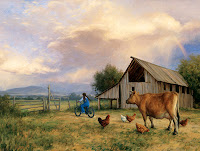 I finished up chapter four of Gene Logsdon book, “The Contrary Farmer”, the other night. So, I thought I would give you some of my thoughts on the chapter titled, “The Peaceable Kingdom of the Barnyard”.
I finished up chapter four of Gene Logsdon book, “The Contrary Farmer”, the other night. So, I thought I would give you some of my thoughts on the chapter titled, “The Peaceable Kingdom of the Barnyard”.
In this chapter Mr. Nation kind of gives a run down of animals that the cottage farmer (his phrase) should consider, and how they should consider raising those animals. He points out that chickens should probably be the first choice (was for us), then maybe some sheep, a family cow, some pigs, and then maybe some sort of specialty animal like raising pets for sale or focusing on a minor breed. He has a few practical tips and antidotes in each section of the chapter dealing with the livestock, but it is not a how-to, beginners guide, or production model type of chapter at all.
A couple things I appreciated from the chapter were his mention of minor breeds (I have a place in my heart for our historical minor breeds) and his thoughts on a new type of family cow. Mr. Nation proposes that there is a alternative to the historical family cow that was mostly used to supply milk and possibly labor for the family. He realizes that milking isn’t something every cottager (again, his phrase) will have time to do because he is assuming that the farm is just a piece of the puzzle, possibly even a small piece of the puzzle. So, he feels that the family cow should now become a vessel for raising beef for the freezer. Mr. Nation’s cow calves in the spring and then the calf is butchered in the fall. He never weans the calf, never cuts it if it is a bull calf, and never has to worry about stored forages because the cow and the grass will supply all of the feed needs.
That is a pretty interesting concept and something I think would work out great for someone who was trying to add some self-sufficiency to their life, but the barnyard tips and thoughts in this chapter seem like they are most intended for someone who maintains a full-time job, but lives in the country.
Last chapter Mr. Nation talked about gardens being the proving ground for farms. And, I believe that is how I view this book. It puts forth a lot of great ideas that he is doing on the small scale of his 30 or so acres, but it isn’t providing the nuts and bolts, or even the philosophy, behind a full-time agricultural farm. Mr. Nation does not refer to himself as a farmer as much as he refers to himself as a cottager (I thought those were people who stayed at lake houses in the summer). He writes at home and does a few small-scale farming things on the side to provide for his family and add some extra income. Which always makes me think … I wish I could write!
To be honest I was a little less impressed with this chapter, but that doesn’t mean that I didn’t like it. I just think that I had higher hopes for the book after all of the positive reviews I read. That being said, the next chapter about water does seem pretty interesting and I’m sure will have lots of good thoughts.


Dean Fleharty from the PDCA told me about 2 calves that he used for meat right off the cow. He had wanted to try it for a while and when he got a bull calf with some “male problems” he tried him out. What he did was he left the calves on the cow for I believe 10 months. Then took them to the butcher. The cow had a little rest period and then had another calf. He said that he got (I believe) 200 lbs hanging weight from the calf and he also milked the cow 2 or 3 times a week after keeping the calf off of the cow over night.
Steven, thanks for that information. It is interesting to here the about the experience from the Dexter standpoint.
Thanks for sharing. I’ve dabbled in this book and have never been able to read through it because I couldn’t find any practical info on how to work towards making a full-time living from farming. One thing I wanted to ask is if this chapter was written by Allan Nation. I was under the impression that the entire book was written by Logsdon, but in this entry you talk about what Mr. Nation says. I thought Allan Nation was all about drawing profits from pasture-fed cattle…?
Wow, you caught the mistakes are made when you read multiple books at once and write quick blog posts! Thanks for pointing that out I will fix that because you are totally correct.
That’s a long edit process there Ethan. The post still isn’t fixed 3 years later 😉
On a serious note, thanks for taking the time to record your thoughts on the book. I’m just now starting the research stage for our farm. I’ve been reading your blog for awhile and decided recently to go back to the beginning to see how you got to where you are now. Very interesting and inspirational.
I hope all is well with you, your wife and children.
Richard Parsons
Parsons Farmstead